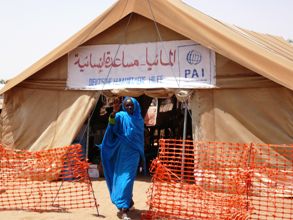Peacekeepers resume patrols of Zamzam camp amid Darfur fighting
By Daniel Van Oudenaren
September 15, 2008 (WASHINGTON) — Following an agreement reached between the UN-African Union Mission in Darfur (UNAMID) and the high command of the Minawi faction of the Sudanese Liberation Army (SLA), UNAMID police patrols of Zamzam internally displaced persons camp resumed on Friday after a four month suspension, according to a press briefing released Sunday.

As the only rebel commander to have signed a May 2006 peace agreement, Minawi had moved to Khartoum and joined the government, prompting many of his forces to abandon him and form the SLA-Unity command. Minawi has since returned to forces loyal to him in Darfur in the wake of a government crackdown on western Sudanese in Khartoum, which began May 10 after another rebel group, the Justice and Equality Movement (JEM), attacked outlying areas of Khartoum.
“Most premises were poke-marked by bullets and some houses were burnt down,” UNAMID stated after the first patrol of the camp on Friday.
Sudan’s Central Reserve Police attacked Zamzam camp on Sept. 10, according to separate reports from Darfur rebels and a traditional leader in the camp. CNN’s Nic Robertson featured Zamzam camp in the story “Rape is a way of life for Darfur’s women,” aired June 19.
The peacekeeping mission said additionally that there was a looting incident on Sept. 8 in Tawila, about 50 km (31 miles) from Zamzam. A group of Janjaweed entered the marketplace near the UNAMID base in Tawila, triggering confrontation between the locals and the Janjaweed until a government police commander who had come to pay a visit to the UNAMID company commander rushed to the place with a section of his men and chased the Janjaweed away.
The incident preceded significant fighting in the area, where recent reports indicate the government has launched an offensive. UNAMID reported GoS troop movements in the Tawila area Sept. 10. The peacekeeping mission stated that a UN helicopter was fired at on Sunday on its way to Shangil Tobaya from Tawila town, about 37 km before Shangil Tobaya UNAMID base camp.
The helicopter was able to land safely with 12 passengers and 4 crew members, but one of its fuel tanks was leaking. After temporary repairs the helicopter left for El Fasher, leaving behind all 12 passengers for security reasons. This is the third time a UN helicopter has been fired at.
SLA-Unity commander Ahmed Kubur Jibril said Saturday that there were attacks on the villages of Tarny, Khazan Tungur (about 20 km or 12 miles from Tawila) and other settlements southwest of Tawila, according to Andrew Heavens with Reuters, who spoke with Jibril via satellite phone. Sudan Tribune reported on Friday that new attacks had begun that day, according to a rebel commander in Khazan Tunger—Salah Bob from the faction of Abdel Wahid Al-Nur.
The fighting in Khazan Tunjur left a clinic as well as four surrounding villages burned down on Sunday morning, according to Partner Aid International (PAI), a medical service provider and development organization. PAI announced Sunday that it had been forced to withdraw medical services for the population living west of El Fashir.
“Large groups of the remaining population in the area are fleeing the area. … For security reasons, PAI-staff evacuated the area [on Sept. 9],” said the statement.
Khazan Tunjur was PAI’s first project area in Darfur, begun in Sept. 2005, said Isaac Williams, the deputy country director for PAI’s Sudan program. The NGO had to shut down operations from early 2007 until May 2008 due to a spate of carjackings. The fighting is of “serious concern because PAI is providing the only health care in this whole large area,” added Williams.
PAI has 65 national staff and eight international staff for Darfur and operates clinics in the Dar-el-Salaam hospital, in Tukumare southeast of Talit, and in El Salaam refugee camp. The organization has not yet evacuated El Fasher. PAI’s Chief Executive Officer Jochen Schmidt said, “our goal is to re-establish access to the affected areas as soon as security allows in order to provide life saving health care services.” Williams stressed that PAI is a neutral provider of humanitarian assistance.
Offensive operations in many of the same areas of eastern Jebel Marra were reported last week as well. All of these areas are between El Fasher, the government-held capital of North Darfur, and the rebel stronghold to the southwest, in the heart of Jebel Marra.
The heaviest fighting is reported in North Darfur, but security incidents occurred in the west and south of the region as well. On Sunday two UNAMID engineering staff in separate vehicles were shot at by Janjaweed dressed in army uniform about 5 km (3.1 miles) away from UNAMID Sector West Headquarters (HQ) on the road from El Geneina. The men were uninjured and reported that the incident took place near a government military detachment.
UNAMID also reports that a Toyota Land Cruiser was hijacked by three armed men on Sept. 8 in the Nahza area, near Nyala town in South Darfur.
The implications of the attacks are potentially grave for Darfur’s estimated 2.7 million displaced persons (IDPs). Until violence subsides, most IDPs cannot return to their land or pastures, some of which have been settled by Darfur Arabs or foreign tribes. Without livelihoods, IDPs depend largely on the World Food Programme (WFP), which warned on Sept. 7 that the deterioration of the security situation in Darfur could force it to suspend food distribution in the troubled region.
(ST)
